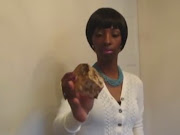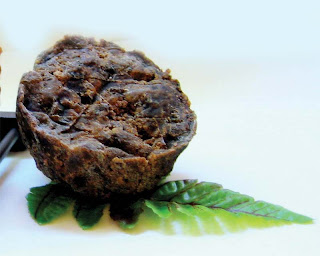Although Scottish historian David Mac Ritchie never mentioned whether he believed the Irish invented black soap, he did conclude that the original Leprechauns were ethnically the wee Twa people of Africa.
He points out that some of the early inhabitants of Ireland were Black wee people standing 3 to 3.5 feet tall. They had great knowledge of many things including medicinal technology (And African Black Soap). This knowledge of herbs and other wisdom was considered magic by the local people. Later this magic came to be symbolized by the magic dust of the leprechaun, which we now find out is actually the ash from the Plantain skin, which forms the base of Black Soap. I always found these findings most interesting.
A recent comment to an article in the MSNBC/Newsvine column caused me to look around in Cyberspace for more information. The three paragraphs belowand the link to their origin is what I came across:
"...Candid authorities like the British Egyptologists Gerald Massey and Albert Churchward, the Scottish historian David Mac Ritchie, and the British antiquarian Godfrey Higgins, have done exhaustive research and brought many facts to our knowledge.
Tacitus, Pliny, Claudian and other writers have described the Blacks they encountered in the British Isles as “Black as Ethiopians,” “Cum Nigris Gentibus,” “nimble-footed blackamoors, and so on.
From all indications, the ancient dwellers of the British Isles and Ireland, like the Kymry (one of the names given to the earliest inhabitants, from whom the Picts and Scots descended), were Blacks. David Mac Ritchie has provided substantial evidence in his two-volume work, Ancient and Modern Britons that the Picts as well as the ancient Danes were Blacks.
The Partholans, Formorians, Nemeds, Firbolgs, Tuatha De Danann, Milesians of Ireland and the Picts of Northern Scotland were all Blacks. The Firbolgs (believed to be a section of the Nemeds) are believed to be so-called pygmies or the Twa. They are the dwarfs, dark elves or leprechauns in Irish History. The British Egyptologist Albert Churchward is convinced that the Tuatha-de-Danann, who came to Ireland, were of the same race and spoke the same language as the Fir-Bogs and the
Formorians..."
So now we know why Guiness, like African Black soap is dark in colour... and so damned good!
Happy St Patrick’s day

Or click on the Book cover to receive your free gift:
Read more »
He points out that some of the early inhabitants of Ireland were Black wee people standing 3 to 3.5 feet tall. They had great knowledge of many things including medicinal technology (And African Black Soap). This knowledge of herbs and other wisdom was considered magic by the local people. Later this magic came to be symbolized by the magic dust of the leprechaun, which we now find out is actually the ash from the Plantain skin, which forms the base of Black Soap. I always found these findings most interesting.
A recent comment to an article in the MSNBC/Newsvine column caused me to look around in Cyberspace for more information. The three paragraphs belowand the link to their origin is what I came across:
"...Candid authorities like the British Egyptologists Gerald Massey and Albert Churchward, the Scottish historian David Mac Ritchie, and the British antiquarian Godfrey Higgins, have done exhaustive research and brought many facts to our knowledge.
Tacitus, Pliny, Claudian and other writers have described the Blacks they encountered in the British Isles as “Black as Ethiopians,” “Cum Nigris Gentibus,” “nimble-footed blackamoors, and so on.
From all indications, the ancient dwellers of the British Isles and Ireland, like the Kymry (one of the names given to the earliest inhabitants, from whom the Picts and Scots descended), were Blacks. David Mac Ritchie has provided substantial evidence in his two-volume work, Ancient and Modern Britons that the Picts as well as the ancient Danes were Blacks.
The Partholans, Formorians, Nemeds, Firbolgs, Tuatha De Danann, Milesians of Ireland and the Picts of Northern Scotland were all Blacks. The Firbolgs (believed to be a section of the Nemeds) are believed to be so-called pygmies or the Twa. They are the dwarfs, dark elves or leprechauns in Irish History. The British Egyptologist Albert Churchward is convinced that the Tuatha-de-Danann, who came to Ireland, were of the same race and spoke the same language as the Fir-Bogs and the
Formorians..."
So now we know why Guiness, like African Black soap is dark in colour... and so damned good!
Happy St Patrick’s day
|
||||
Or click on the Book cover to receive your free gift:
Enjoy












